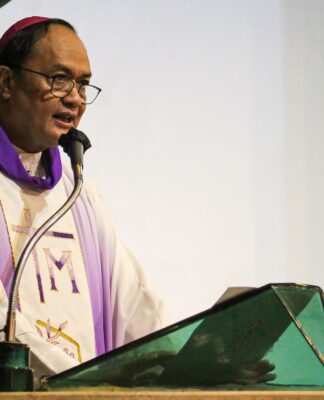As congressional debates over the “reproductive health” (RH) bill near the homestretch, the Church is again confronted by dissident voices, sparking a war of words over the practice of “academic freedom” in Catholic universities.
One hundred ninety-two professors of Jesuit-run Ateneo de Manila University and 45 professors of De La Salle University have issued separate statements contradicting the official Church position against the RH bill, which is seeking billions of pesos in public money to finance a nationwide contraception and sterilization program.
The position of the Catholic Bishops’ Conference of the Philippines (CBCP) and various lay groups is that the RH bill is not the real solution to poverty, and that funds would be better spent on education and livelihood. Moreover, existing laws already cover family planning programs as well as women’s health. In the Senate, the reproductive health agenda has been exposed as a strategy by foreign lobby groups to eventually legitimize abortion—the ultimate birth control.
Aside from the Church ban on contraception, anti-RH groups also point to the dangers of hormonal contraception, which has been proven to increase the risk of breast cancer and other diseases.
Four years after issuing a statement claiming Catholics can support the RH bill in “good conscience,” Ateneo professors again came out in support of the controversial bill, this time endorsing artificial contraception to deal with the “high maternal mortality ratio, the rise in teenage pregnancies, and the increase in the number of HIV/AIDS cases, among others.” The Aug. 13 statement said the Catholic prohibition against contraception is just one of many “competing views.”
The 45 De La Salle professors, meanwhile, endorsed the bill last Sept. 3, saying access to artificial contraceptives was needed to deal with population growth and improve the quality of life.
Ateneo president Fr. Jose Ramon Villarin, S.J. tried to repair the damage by issuing a memo to the university community last Aug. 20. “Together with our leaders in the Catholic Church, the Ateneo de Manila University does not support the passage of the House Bill 4244,” Villarin said. “As many of these leaders have pointed out, the present form of the proposed bill contains provisions that could be construed to threaten constitutional rights, as well as to weaken commonly shared human and spiritual values.”
What angered the anti-RH side is that there was again no rebuke of the dissident professors. Instead, the 192 pro-RH professors were commended for their “social compassion and intellectual efforts.”
Scandal
These recent events fit the Catholic notion of “scandal.” The Catechism of the Catholic Church (CCC) notes that a person causing scandal “damages virtue and integrity; he may even draw his brother into spiritual death…Scandal is grave when given by those who by nature or office are obliged to teach and educate others.”
CCC 2286 states: “Scandal can be provoked by laws or institutions, by fashion or opinion. Therefore, they are guilty of scandal who establish laws or social structures leading to the decline of morals and the corruption of religious practice, or to ‘social conditions that, intentionally or not, make Christian conduct and obedience to the Commandments difficult and practically impossible.’ This is also true of business leaders who make rules encouraging fraud, teachers who provoke their children to anger, or manipulators of public opinion who turn it away from moral values.”
For canon law expert Fr. Jaime Achacoso, these professors are free to espouse teachings contrary to the Catholic faith—outside the Church.
Achacoso said the Church “may withdraw the license to teach for certain professors found to be espousing unorthodox doctrines.”
“The Church is empowered, by Canon Law, not only to wait for an unorthodox professor to transfer on his own volition. He can be banned from the Catholic school. The Church must have the necessary means to guarantee that only sound Catholic doctrine is taught in the officially Catholic institutions of education,” he said.
Achacoso pointed out that teaching views contrary to Church doctrine would confuse students.
“Catholic parents presumably send their children to Catholic universities with the tacit agreement that they would be taught in accordance with their faith. Thus, it is a betrayal of trust for any Catholic university to espouse doctrines on faith and morals which are contrary to the teaching of the Church,” he said.
Former UST rector Fr. Rolando V. de la Rosa, O.P. weighed in on the matter in his Manila Bulletin column last Sept. 8, citing the Apostolic Constitution on Catholic Universities, Ex Corde Ecclesiae. “‘Catholic’ is not just a label given to a school,” he said.
“[T]he document obliges members of the university community to manifest a personal fidelity to the Church, and this implies adherence to its teachings. Every Catholic university worth its name teaches that part of the teaching function of the bishops is precisely to make pastoral judgments on doctrinal and moral issues. It is, therefore, never enough for a Catholic university to declare its adherence to the CBCP position on the RH bill. It must see to it that its teachers do not uphold the contrary position,” said De la Rosa, former chairman of the Commission on Higher Education.
“Catholic universities do not render their service to unity by allowing their members to widely publicize, in the name of academic freedom, opinions that run contrary to the official stand of the Catholic Church on controversial moral issues. Once ideas are written and published, they acquire a life of their own, regardless of the good intentions of the authors,” he said.
Ateneo not a Catholic university?
Some in the Ateneo went as far as to claim that Church laws on Catholic universities do not apply, amid talk that the Jesuit school could go the way of the University of Peru, which was recently stripped of its “Pontifical” and “Catholic” titles.
In the Philippines, only UST has the right to use the title “Catholic University of the Philippines,” but this does not mean Ateneo and De La Salle are not Catholic institutions. Universities that do not bear the title “Catholic University” remain Catholic in fact, according to Canon Law. “The conferences of bishops and diocesan bishops concerned have the duty and right of being watchful so that the principles of Catholic doctrine are observed faithfully in these same universities,” Canon Law states.
Cebu Archbishop Jose Palma, president of the CBCP, told the Varsitarian in a phone interview that the Church has the prerogative to probe Catholic universities espousing ideals opposed to the stand of the Catholic Church.
“If there are professors who do not uphold Catholic teachings, they should teach in other [non-Catholic] universities, because it’s their obligation to tell the students of the teachings of the Church,” Palma said.
Achacoso reiterated that academic freedom is not a license for professors in Catholic schools to promote dissent from Church doctrines.
“Academic freedom does not sit in a vacuum. It is not the unlimited capacity to do or teach whatever. A professor in a Catholic University is in a special position—he is bound by the Catholic identity of the University,” Achacoso added.
Well-formed conscience
Unnoticed was the statement by three Ateneo theology professors last Aug. 28 correcting their colleagues’ position on conscience, in particular for separating conscience from “transcendent truths” and thereby undermining the Catholic faith. Adherence to Church teachings doesn’t mean faithful Catholics do not think. Rather, faithful Catholics use their consciences to search for solutions to problems “in the light of faith,” said Ateneo theology professors Rafael Dy-Liacco, Markus E. Locker, and Josemaria Roberto V. Reyes.
“[I]n the wake of public statements released in 2008 and just recently in connection with the issue of the RH Bill, an erroneous understanding of what being a Catholic in good conscience means has been and is still being disseminated. This erroneous understanding is premised on an erroneous understanding of conscience itself. In this erroneous understanding, conscience is reduced simply to being one’s point of view, which in turn becomes absolute for oneself, set in contradistinction to another’s point of view, and is without any acknowledgment of transcendent truth (cf. Veritatis Splendor 33). But in removing transcendent truth from conscience, this erroneous view undermines faith itself, for God, the object of faith, is transcendent truth. In undermining faith, this erroneous view destroys our capacity to come together as church and as church to seek solutions to our problems. It has resulted in an illusory dichotomy between genuine Catholic faith and the possibility of seeking real solutions to our problems. Indeed, a widening assault upon faith has followed in the wake of this erroneous view, accompanied by the bitter fruit of hatred for the Church,” the statement said.
“[A] good conscience is truthful and seeks the right, and a well-formed Catholic conscience seeks guidance for doing right in the authoritative teachings of the Church (cf. CCC 1783). But should any figure urge one, as a Catholic, to go against these transcendent norms which one has received and in which one has been well-formed, then it is better to disregard that figure than to disregard one’s Catholic conscience,” the statement said. Gracelyn A. Simon

















Is moral ambivalence considered in this issue? If so, how would you approach the realities pertaining to poverty, the lack of education, the majority of Filipinos being Catholics yet the entire country being mired by corruption and other social ills, and the need for means to regulate the sale of contraceptives as well as sex-related industries? It would be a fallacy to say that we don’t have any RH Law yet because several provisions in various enacted laws have been in existence. Would it be too much if an RH bill is passed into law now to validate important provisions, remove contradictions, and summarize all existing laws? Apparently, this issue is based on perspectives, and unless viewpoints are defined and everyone accepts singular meanings, we can never truly move forward and resolve the issue.
Have you read the fulll statement of the 3 Ateneo profs, Bhenjar Toor? Their words are clear as lightning. How would do you explain your own gobbledygook?
Yes, I did. And what is with “we know who you are” tag? A lot of people know me, and that is a given. Whether it is positive or not, who cares. I just speak my mind. Besides, this is a campus newspaper, right? Hence, questions can raised.
To an ordinary guy, all this is a bunch of gobbledygook. But out of the gobbledygook comes a very clear thing: not even the Catholic Church or some “holier-than-thou” student editorialist have the right to insult other individuals or institutions. If you cannot understand a simple concept which I have raised by asking questions, then you don’t deserve to even be in the Varsitarian. During our time, the standards were quite good. You cannot win the UST Journalism presidency, cannot be a writer at the Flame or the Varsitarian if you don’t know your craft. I know the Varsitarian has been underfire. I guess your arrogance just got you what you deserve. However, until now, you have not explained your part. You also have not clarified what you mean by the tag “Submitted by we know who you are, Bhenjar Toor.” You call other insitutions cowards yet your very own writers cannot even put their real names on comment boxes? I say you are just a bunch of unethical crooks using the power of the pen to malign others instead of proposing real change with respect to other people’s opinion. You are mere humans pretending to be higher than mere mortals like us. UST deserves better Varsitarian staff members. During my time, we at the Flame really had the best editing and proofreading exercises courtesy of the Varsitarian. We edited and reviewed the published copies itself. And you should know me very well because I am not the type who will use pseudonyms because I am never afraid of reprisals just because some cowardly writer cannot stand bravely with what he or she has written. And you should know me very well, especially since Lito was my former adviser when I was the JournSoc president. He might be able to enlighten you on how I faced off with the seniors’ batch that united just to stop me from winning. The rest was history because they failed miserably and I went on to do what I must without ever hiding my identity through a nom de plume. Nung panahon namin, hindi kami ganyan ka-bobo at ka-duwag.